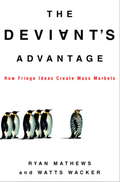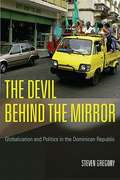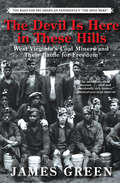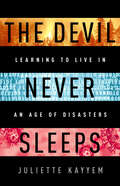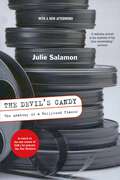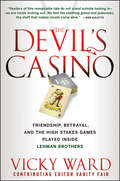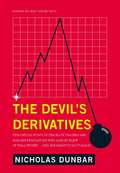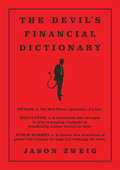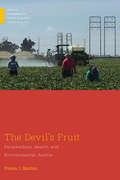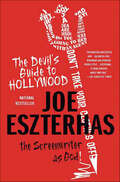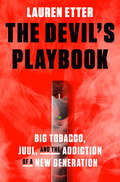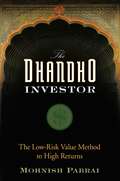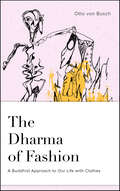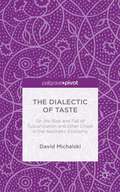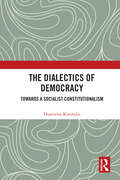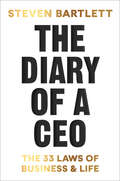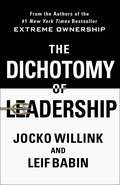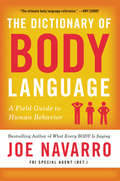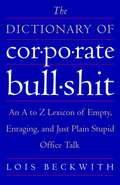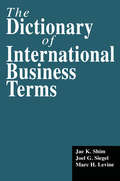- Table View
- List View
The Deviant's Advantage: How Fringe Ideas Create Mass Markets
by Ryan Mathews Watts WackerBusiness consultants Mathews and Wacker argue that all new ideas are seen as deviant at their beginnings. They suggest that there is a linear process by which deviant ideas enter the mainstream and that by analyzing that process entrepreneurs can take advantage of profit-making opportunities that others might miss. They sprinkle their advice with pop-cultural references. Annotation c. Book News, Inc., Portland, OR (booknews.com)
The Devil Behind the Mirror: Globalization and Politics in the Dominican Republic
by Steven GregorySteven Gregory provides a compelling and intimate account of the impact that transnational processes associated with globalization are having on the lives and livelihoods of people in the Dominican Republic. Grounded in ethnographic fieldwork conducted in the adjacent towns of Boca Chica and Andrés, Gregory's study deftly demonstrates how transnational flows of capital, culture, and people are mediated by contextually specific power relations, politics, and history. He explores such topics as the informal economy, the making of a telenova, sex tourism, and racism and discrimination against Haitians, who occupy the lowest rung on the Dominican economic ladder. Innovative and beautifully written, The Devil behind the Mirror masterfully situates the analysis of global economic change in everyday lives.
The Devil Is Here in These Hills: West Virginia's Coal Miners and Their Battle for Freedom
by James GreenFrom before the dawn of the 20th century until the arrival of the New Deal, one of the most protracted and deadly labor struggles in American history was waged in West Virginia. On one side were powerful corporations whose millions bought armed guards and political influence. On the other side were 50,000 mine workers, the nation’s largest labor union, and the legendary "miners’ angel,” Mother Jones. The fight for unionization and civil rights sparked a political crisis verging on civil war that stretched from the creeks and hollows to the courts and the US Senate. In The Devil is Here in These Hills, celebrated labor historian James Green tells the story of West Virginia and coal like never before.The value of West Virginia’s coalfields had been known for decades, and after rail arrived in the 1870s, industrialists pushed fast into the wilderness, digging mines and building company towns where they wielded nearly complete control over everyday life. The state’s high-quality coal drove American expansion and industrialization, but for tens of thousands of laborers, including boys as young as ten, mining life showed the bitter irony of the state motto, "Mountaineers are Always Free.” Attempts to unionize were met with stiff resistance. Fundamental rights were bent, then broken, and the violence evolved from bloody skirmishes to open armed conflict, as an army of miners marched to an explosive showdown. Extensively researched and told in vibrant detail, The Devil is Here in These Hills is the definitive book on an essential chapter in the history of American freedom.
The Devil Never Sleeps: Learning to Live in an Age of Disasters
by Juliette KayyemAn urgent, transformative guide to dealing with disasters from one of today&’s foremost thinkers in crisis management.The future may still be unpredictable, but nowadays, disasters are not. We live in a time of constant, consistent catastrophe, where things more often go wrong than they go right. So why do we still fumble when disaster hits? Why are we always one step behind?In The Devil Never Sleeps, Juliette Kayyem lays the groundwork for a new approach to dealing with disasters. Presenting the basic themes of crisis management, Kayyem amends the principles we rely on far too easily. Instead, she offers us a new framework to anticipate the &“devil&’s&” inevitable return, highlighting the leadership deficiencies we need to overcome and the forward thinking we need to harness. It&’s no longer about preventing a disaster from occurring, but learning how to use the tools at our disposal to minimize the consequences when it does.Filled with personal anecdotes and real-life examples from natural disasters like the California wildfires to man-made ones like the Boeing 737 MAX crisis, The Devil Never Sleeps is a guide for governments, businesses, and individuals alike on how to alter our thinking so that we can develop effective strategies in the face of perpetual catastrophe.
The Devil's Candy: The Anatomy Of A Hollywood Fiasco
by Julie Salamon"A definitive portrait of the madness of big-time moviemaking" (Newsweek), now the basis for the new season of TCM's hit podcast, "The Plot Thickens" and featuring a new afterword by the authorWhen Brian De Palma agreed to allow Julie Salamon unlimited access to the film production of Tom Wolfe's best-selling book The Bonfire of the Vanities, both director and journalist must have felt like they were on to something big. How could it lose? But instead Salamon got a front-row seat at the Hollywood disaster of the decade. She shadowed the film from its early stages through the last of the eviscerating reviews, and met everyone from the actors to the technicians to the studio executives. They'd all signed on for a blockbuster, but there was a sense of impending doom from the start--heart-of-gold characters replaced Wolfe's satiric creations; affable Tom Hanks was cast as the patrician heel; Melanie Griffith appeared mid-shoot with new, bigger breasts. With a keen eye and ear, Salamon shows us how the best of intentions turned into a legendary Hollywood debacle.The Devil's Candy joins John Gregory Dunne's The Studio, Steven Bach's Final Cut, and William Goldman's Adventures in the Screen Trade as a classic for anyone interested in the workings of Hollywood. With a new afterword profiling De Palma ten years after the movie's devastating flop (and this book's best-selling publication), Julie Salamon has created a riveting insider's portrait of an industry where art, talent, ego, and money combine and clash on a monumental scale.
The Devil's Casino
by Vicky WardThe inside story of what really happened at Lehman Brothers and why it failed In The Devil's Casino: Friendship, Betrayal, and the High Stakes Games Played Inside Lehman Brothers, investigative writer and Vanity Fair contributing editor Vicky Ward takes readers inside Lehman's highly charged offices. What Ward uncovers is a much bigger story than Lehman losing at the risky game of collateralized debt obligations, swaps, and leverage. A can't put it down page turner that opens the world of Wall Street to view unlike any book since Bonfire of the Vanities, except that The Devil's Casino isn't fiction. Details what went on behind-the-scenes the weekend Lehman Brothers failed, as well as inside Lehman during the twenty years preceding it Describes the feudal culture that proved both Lehman's strength and its Achilles' heel Written by Vicky Ward, one of today's most connected business and finance writers On Wall Street, Lehman Brothers was cheekily known as "the cat with nine lives. " But as The Devil's Casino documents, this cat pushed its luck too far and died?the victim of men and women blinded by arrogance.
The Devil's Cup: A History of the World According to Coffee
by Stewart Lee AllenFrom the book: In this captivating book, Stewart Lee Allen treks three-quarters of the way around the world on a caffeinated quest to answer these profound questions: Did the advent of coffee give birth to an enlightened western civilization? Is coffee, indeed, the substance that drives history? From the cliff-hanging villages of Southern Yemen, where coffee beans were first cultivated eight hundred years ago, to a cavernous coffeehouse in Calcutta, the drinking spot for two of India's three Nobel Prize winners...from Parisian salons and cafes where the French Revolution was born, to the roadside diners and chain restaurants of the good ol' USA, where something resembling brown water passes for coffee, Allen wittily proves that the world was wired long before the Internet. And those who deny the power of coffee (namely tea-drinkers) do so at their own peril.
The Devil's Derivatives
by Nicholas DunbarA compelling narrative on what went wrong with our financial system-and who's to blame.From an award-winning journalist who has been covering the industry for more than a decade, The Devil's Derivatives charts the untold story of modern financial innovation-how investment banks invented new financial products, how investors across the world were wooed into buying them, how regulators were seduced by the political rewards of easy credit, and how speculators made a killing from the near-meltdown of the financial system.Author Nicholas Dunbar demystifies the revolution that briefly gave finance the same intellectual respectability as theoretical physics. He explains how bankers worldwide created a secret trillion-dollar machine that delivered cheap mortgages to the masses and riches beyond dreams to the financial innovators.Fundamental to this saga is how "the people who hated to lose" were persuaded to accept risk by "the people who loved to win." Why did people come to trust and respect arcane financial tools? Who were the bankers competing to assemble the basic components into increasingly intricate machines? How did this process achieve its own unstoppable momentum-ending in collapse, bailouts, and a public outcry against the giants of finance?Provocative and intriguing, The Devil's Derivatives sheds much-needed light on the forces that fueled the most brutal economic downturn since the Great Depression.
The Devil's Financial Dictionary
by Jason ZweigYour Survival Guide to the Hades of Wall Street The Devil’s Financial Dictionary skewers the plutocrats and bureaucrats who gave us exploding mortgages, freakish risks, and banks too big to fail. And it distills the complexities, absurdities, and pomposities of Wall Street into plain truths and aphorisms anyone can understand. An indispensable survival guide to the hostile wilderness of today’s financial markets, The Devil’s Financial Dictionary delivers practical insights with a scorpion’s sting. It cuts through the fads and fakery of Wall Street and clears a safe path for investors between euphoria and despair. Staying out of financial purgatory has never been this fun.
The Devil's Fruit: Farmworkers, Health, and Environmental Justice (Medical Anthropology)
by Dvera I. SaxtonThe Devil's Fruit describes the facets of the strawberry industry as a harm industry, and explores author Dvera Saxton’s activist ethnographic work with farmworkers in response to health and environmental injustices. She argues that dealing with devilish—as in deadly, depressing, disabling, and toxic—problems requires intersecting ecosocial, emotional, ethnographic, and activist labors. Through her work as an activist medical anthropologist, she found the caring labors of engaged ethnography take on many forms that go in many different directions. Through chapters that examine farmworkers’ embodiment of toxic pesticides and social and workplace relationships, Saxton critically and reflexively describes and analyzes the ways that engaged and activist ethnographic methods, frameworks, and ethics aligned and conflicted, and in various ways helped support still ongoing struggles for farmworker health and environmental justice in California. These are problems shared by other agricultural communities in the U.S. and throughout the world.
The Devil's Guide to Hollywood: The Screenwriter as God!
by Joe EszterhasIn The Devil's Guide to Hollywood, bestselling author and legendary bad-boy screenwriter Joe Eszterhas tells everything he knows about the industry, its players and screenwriting itself—from the first blank sheet of paper in the Olivetti to the size of the credit on the one-sheet. "There's just one hunk of funny anecdote after another, quotes from everyone who ever mattered in the movie biz, and the thing is jam-packed with screenwriterly advice. Plus it's hilariously funny, ribald, sexy and brilliant."—Liz SmithOften practical and always entertaining, The Devil's Guide to Hollywood distills everything one of Hollywood's most accomplished screenwriters knows about the business, from writing advice to negotiation tricks, from the wisdom of past players to the feuds of current ones. Eszterhas has selected his personal pantheon of the most loved and loathed players in the business and treats the reader to a treasure trove of stories, quotes and wisdom from those luminaries, who include William Goldman (loathes) and Zsa Zsa Gabor (loves). The Devil's Guide to Hollywood could only have been written by someone who loves the business as much as Eszterhas does—but who also has its number."Eszterhas delivers a dishy, catty mix of reminiscences and Hollywood trivia…his forte is skewering sycophants and phonies in this opinionated showcase of the underside of Hollywood life."—Publishers Weekly
The Devil's Playbook: Big Tobacco, Juul, and the Addiction of a New Generation
by Lauren EtterBig Tobacco meets Silicon Valley in this corporate exposé of what happened when two of the most notorious industries collided—and the vaping epidemic was born.&“The best business book I&’ve read since Bad Blood.&”—Jonathan Eig, New York Times bestselling author of Ali: A Life Howard Willard lusted after Juul. As the CEO of tobacco giant Philip Morris&’s parent company and a veteran of the industry&’s long fight to avoid being regulated out of existence, he grew obsessed with a prize he believed could save his company—the e-cigarette, a product with all the addictive upside of the original without the same apparent health risks and bad press. Meanwhile, in Silicon Valley, Adam Bowen and James Monsees began working on a device that was meant to save lives and destroy Big Tobacco, but they ended up baking the industry&’s DNA into their invention&’s science and marketing. Ultimately, Juul&’s e-cigarette was so effective and so market-dominating that it put the company on a collision course with Philip Morris and sparked one of the most explosive public health crises in recent memory. In a deeply reported account, award-winning journalist Lauren Etter tells a riveting story of greed and deception in one of the biggest botched deals in business history. Etter shows how Philip Morris&’s struggle to innovate left Willard desperate to acquire Juul, even as his own team sounded alarms about the startup&’s reliance on underage customers. And she shows how Juul&’s executives negotiated a lavish deal that let them pocket the lion&’s share of Philip Morris&’s $12.8 billion investment while government regulators and furious parents mounted a campaign to hold the company&’s feet to the fire.The Devil&’s Playbook is the inside story of how Juul&’s embodiment of Silicon Valley&’s &“move fast and break things&” ethos wrought havoc on American health, and how a beleaguered tobacco company was seduced by the promise of a new generation of addicted customers. With both companies&’ eyes on the financial prize, neither anticipated the sudden outbreak of vaping-linked deaths that would terrorize a nation, crater Juul&’s value, end Willard&’s career, and show the costs in human life of the rush to riches—while Juul&’s founders, board members, and employees walked away with a windfall.
The Devil's Riches: A Modern History of Greed
by Jared PoleyA seeming constant in the history of capitalism, greed has nonetheless undergone considerable transformations over the last five hundred years. This multilayered account offers a fresh take on an old topic, arguing that greed was experienced as a moral phenomenon and deployed to make sense of an unjust world. Focusing specifically on the interrelated themes of religion, economics, and health-each of which sought to study and channel the power of financial desire-Jared Poley shows how evolving ideas about greed became formative elements of the modern experience.
The Dhandho Investor
by Mohnish PabraiA comprehensive value investing framework for the individual investor In a straightforward and accessible manner, The Dhandho Investor lays out the powerful framework of value investing. Written with the intelligent individual investor in mind, this comprehensive guide distills the Dhandho capital allocation framework of the business savvy Patels from India and presents how they can be applied successfully to the stock market. The Dhandho method expands on the groundbreaking principles of value investing expounded by Benjamin Graham, Warren Buffett, and Charlie Munger. Readers will be introduced to important value investing concepts such as "Heads, I win! Tails, I don't lose that much!," "Few Bets, Big Bets, Infrequent Bets," Abhimanyu's dilemma, and a detailed treatise on using the Kelly Formula to invest in undervalued stocks. Using a light, entertaining style, Pabrai lays out the Dhandho framework in an easy-to-use format. Any investor who adopts the framework is bound to improve on results and soundly beat the markets and most professionals.
The Dharma and Socially Engaged Buddhist Economics (Studies in Buddhist Economics, Management, and Policy)
by Joel MagnusonThis book defends and articulates an “Engaged Buddhist” approach to economics as a response to the destructive effects of global capitalism. The author posits that Buddhist understandings of the distortions of greed, aversion, and ignorance can be read to apply not only to mental states but also to socio-political ones, and that such a reading suggests rational responses to current social and environmental challenges. The book proposes that we engage both “inner and outer” modes of transformation through which to free ourselves from our current human-made, dysfunctional systems: the former, by examining the workings of our own minds, the latter by criticizing and reforming our economic systems. Since traditional Buddhism provides few sources to build a Buddhist economic vision, this work brings together Buddhist notions of skillful practice, John Dewey’s pragmatic principles for social provisioning, and institutional economics. The author provides two case studies for experiments in Buddhist-based socioeconomic policies, Thailand and Bhutan. Of special interest is the implied parallel between worldviews emerging from modern socially-engaged Buddhism and Dewey’s notion of a human existential drive to shape the world in collectively beneficial ways.
The Dharma of Fashion: A Buddhist Approach to Our Life with Clothes
by Otto von BuschOur desires for fashion, our addiction to cheap clothes, our fixation on surface looks . . . can we find ways to make what we wear more positive? Here's a quirky, irreverent way to consider what's a more sustainable way to be with—and still enjoy—fashion. This little book shows that fashion isn't shallow but connects us to the depths of existence. Especially today, fashion can tell us something about life, and this series of meditations and conversations between fashion "hacktivist" von Busch and Buddhist teacher Josh Korda shows how a Buddhist perspective on fashion can help us engage with clothes in wiser ways. It may seem a Buddhist approach to fashion would be about denying fashion and living an ascetic life in dull robes. However, Buddhism can teach us to be more present and take more pleasure in fashion. With practice and reflection, we can live a wiser life with the consumption of clothes. Includes "action exercises" to help put ideas into practice in your life and closet.
The Diabetes Textbook: Clinical Principles, Patient Management and Public Health Issues
by Joel Rodriguez-SaldanaDiabetes has become a worldwide health problem, the global estimated prevalence approaches ten percent and the burden of this disease in terms of morbidity and mortality is unprecedented. The advances acquired through the knowledge of the mechanisms of the disease and the variety of therapeutic approaches contrast with the inability of private and public health systems in underdeveloped and even developed countries to achieve the goals of treatment. This paradox has been described in many sources: the surge of scientific advances contrast with an unprecedented amount of human suffering. Thus, a patient centered and an evidence based approach with the capacity to produce measurable clinical and economic outcomes is required. The purpose of this textbook is multiple: to offer a comprehensive resource covering all aspects of outpatient management; to address diabetes as a health problem from an epidemiological, economic and clinical perspective; to discuss the role of social determinants of health on the worldwide increase in diabetes; to highlight the challenges and obstacles in providing adequate care; and to outline a multidisciplinary approach to management in which medical visits retain their importance as part of a team comprising the patient, his or her family and a multidisciplinary group of health professionals who are able to move beyond the traditional approach of diabetes as a disease and greatly improve outcomes.
The Dialectic Of Taste
by David MichalskiThe Dialectic of Taste provides a new way of thinking about the aesthetization of everyday life and the aesthetic economy. It configures taste as a kind of labor, one that is increasingly exploited in an economy geared to convert cultural capital to monetary value. This book examines the cultural fallout of this conversion. The movements of the dialectic of taste are illustrated through a study of Tuscan motifs in contemporary consumer culture. From this examination, a social process of Tuscanization is shown to take shape as a response to crises associated with McDonaldization. By applying a historical materialist approach to the interpretation of consumer culture, The Dialectic of Taste demonstrates how distorted images of beauty, trapped in everyday commodities, can come to represent collective social demands, and provoke social change. In doing so, this book provides a bold new trajectory for critical theory, cultural studies, and the sociology of taste.
The Dialectics of Democracy: Towards a Socialist Constitutionalism
by Dimitrios KivotidisThis book examines how the democratic form and the struggle for democracy reflects, influences and shapes the struggle for social emancipation.In the context of increased exploitation, rising inequality, and intensified struggle for social justice in the aftermath of the economic crisis, the channelling of populism through liberal democratic institutions has had contradictory effects: giving rise to both Corbyn and Brexit, Sanders and Trump, Syriza and the Golden Dawn, to name but a few. How can we make sense of these developments? In response, this book approaches the idea of democracy from a socialist constitutionalist standpoint and explores institutional forms and principles that challenge and aim at the transformation of the extant social order. This process involves the challenging of well-established ideas of the liberal viewpoint, as well as an unwavering focus on the issue of class rule which enables the highlighting of limitations of -not only mainstream but also heterodox- contemporary approaches to constitutionalism and democracy. Ultimately, democracy is conceived as a process of struggle for creating the conditions, material as well as intellectual, for its actualisation.This significant work of legal and political theory will be of considerable interest to those working in these areas to make sense of contemporary developments, and to further the causes of social justice and social emancipation.
The Diamond in the Rough: How to Keep Finding Your Best Competitive Position-as Market Dynamics Change
by Richard A. D'AveniSpotting a threat of commoditization-and taking preventative action-is a critical survival skill for your organization. At the same time, for those prepared to seize the day, commoditization can present opportunities as well as threats. How do you exploit these windows of opportunity? In this chapter Richard A. D'Aveni explores a different perspective on dealing with commodity traps-anticipating them so you can stake out an advantageous position. Specifically, he shows how organizations can use price-benefit analysis to understand shifts in competitive dynamics and positions, as well as to anticipate these shifts. Examples from a hotel restaurant and the real estate industry provide vivid and actionable examples of how organizations can put this analysis to work to vault over the commodity traps that threaten them. This chapter was originally published as Chapter 5 of Beating the Commodity Trap: How to Maximize Your Competitive Position and Increase Your Pricing Power.
The Diary of a CEO: The 33 Laws of Business and Life
by Steven BartlettA galvanizing playbook for success from Steven Bartlett, one of the world&’s most exciting entrepreneurs and the host of the No. 1 podcast The Diary of a CEO"This is a must-read for anyone dreaming of doing something audacious." Jay Shetty"Valuable lessons about the importance of following a different and unconventional path to power.&” Robert GreeneAt the very heart of all the success and failure I've been exposed to - both my own entrepreneurial journey and through the thousands of interviews I&’ve conducted on my chart-topping podcast - are a set of principles that ensure excellence.These fundamental laws underpinned my meteoric rise, and they will fuel yours too, whether you want to build something great or become someone great. The laws are rooted in psychology and behavioral science, in my own experiences, and those of the world's most successful entrepreneurs, entertainers, artists, writers, and athletes, who I&’ve interviewed on my podcast.These laws will stand the test of time and will help anyone master their life and unleash their potential, no matter the field.They are the secret sauce to success.
The Dichotomy of Leadership: Balancing the Challenges of Extreme Ownership to Lead and Win
by Jocko Willink Leif Babin<P><P>From the #1 New York Times bestselling authors of Extreme Ownership comes a new and revolutionary approach to help leaders recognize and attain the leadership balance crucial to victory. With their first book, Extreme Ownership (published in October 2015), Jocko Willink and Leif Babin set a new standard for leadership, challenging readers to become better leaders, better followers, and better people, in both their professional and personal lives. <P><P>Now, in THE DICHOTOMY OF LEADERSHIP, Jocko and Leif dive even deeper into the unchartered and complex waters of a concept first introduced in Extreme Ownership: finding balance between the opposing forces that pull every leader in different directions. Here, Willink and Babin get granular into the nuances that every successful leader must navigate. Mastering the Dichotomy of Leadership requires understanding when to lead and when to follow; when to aggressively maneuver and when to pause and let things develop; when to detach and let the team run and when to dive into the details and micromanage. In addition, every leader must:· <P><P>Take Extreme Ownership of everything that impacts their mission, yet utilize <P><P>Decentralize Command by giving ownership to their team. · <P><P>Care deeply about their people and their individual success and livelihoods, yet look out for the good of the overall team and above all accomplish the strategic mission. · <P><P>Exhibit the most important quality in a leader—humility, but also be willing to speak up and push back against questionable decisions that could hurt the team and the mission. <P><P>With examples from the authors’ combat and training experiences in the SEAL teams, and then a demonstration of how each lesson applies to the business world, Willink and Babin clearly explain THE DICHOTOMY OF LEADERSHIP—skills that are mission-critical for any leader and any team to achieve their ultimate goal: VICTORY. <P><b>A New York Times Bestseller</b>
The Dictionary of Body Language: A Field Guide to Human Behavior
by Joe NavarroFrom the world’s #1 body language expert* comes the essential book for decoding human behavior Joe Navarro has spent a lifetime observing others. For 25 years, as a Special Agent for the FBI, he conducted and supervised interrogations of spies and other dangerous criminals, honing his mastery of nonverbal communication. After retiring from the bureau, he has become a sought-after public speaker and consultant, and an internationally bestselling author. Now, a decade after his groundbreaking book What Every BODY is Saying, Navarro returns with his most ambitious work yet. The Dictionary of Body Language is a pioneering “field guide” to nonverbal communication, describing and explaining the more than 400 behaviors that will allow you to gauge anyone’s true intentions.Moving from the head down to the feet, Navarro reveals the hidden meanings behind the many conscious and subconscious things we do. Readers will learn how to tell a person’s actual feelings from subtle changes in their pupils; the lip behaviors that betray concerns or hidden information; the many different varieties of arm posturing, and what each one means; how the position of our thumbs when we stand akimbo reflects our mental state; and many other fascinating insights to help you both read others and change their perceptions of you.Readers will turn to The Dictionary Body Language again and again—a body language bible for anyone looking to understand what their boss really means, interpret whether a potential romantic partner is interested or not, and learn how to put themselves forward in the most favorable light.*GlobalGurus.com
The Dictionary of Corporate Bullshit: An A to Z Lexicon of Empty, Enraging, and Just Plain Stupid Office Talk
by Lois BeckwithThis caustically funny Webster's of the workplace cuts to the true meaning of the inane argot spouted in cubicles and conference rooms across the land. At a price even an intern can afford and in a handy paperback format that won't weigh down your messenger bag or briefcase, The Dictionary of Corporate Bullshit is a hilarious guide to the smoke-screen terms and passive-aggressive phrases we traffic in every day. Each entry begins with a straight definition followed by a series of alternative meanings that are, of course, what is really meant.Take, for example, the widely used, seemingly innocuous term brainstorming:1. to generate ideas as a group in an accepting environment and in a free-form manner2. a supposedly relaxed forum in which no idea is a bad idea - that is, until you generate a bad idea and are met with uncomfortable silence/looks that suggest you are retarded or really uncool/the feeling that you are about to be firedBeyond deciphering corporate commonplaces, you'll learn the PC term for secret Santa (Holiday Harry); why the Blackberry is "most commonly referred to as a 'Crackberry' due to its highly addictive nature"; and that when a co-worker says "Have a good night", they really mean: "this meaningless, seemingly interminable exchange of small talk is now over. I am no longer speaking to you, and will now flee this awkward social situation. Don't even think of asking which way I'm walking."Just remember to read this only at COB (close of business) to avoid being busted (caught idling by your boss).From the Trade Paperback edition.
The Dictionary of International Business Terms (Glenlake Business Reference Bks.)
by Jae K. Shim Joel G. Siegel Marc H. LevineThe diversity and complexity associated with the increasing globalization and integration of economies require a familiarity with information technology and terminologies associated with international business. The Dictionary of International Business Terms will be valuable to students and professionals in all areas of business who need to keep abreast of this rapidly changing environment. Over 2,000 terms are defined with examples, charts and illustrations. Additional key areas covered include: global accounting and taxation; exports and imports; global trade, law, and regulations; international organizations; international finance, banking, and investments; economic and business strategies; and management of multinational corporations.
